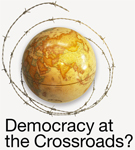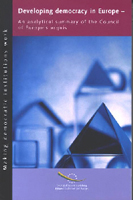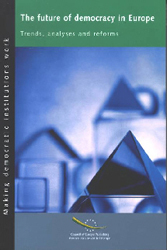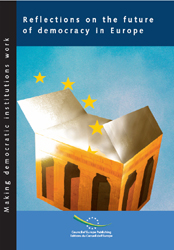
“The future of democracy in Europe — trends, analyses and reforms” is the title of a Green Paper published by the Council of Europe about 24 months ago.
It is one the key outputs of the Council’s integrated project on “Making democratic institutions work”, the second one being a closely related publication entitled “Developing democracy in Europe — an analytical summary of the Council of Europe’s acquis”.
Based on the analysis presented in the latter book, the Green Paper puts forward twenty-eight democratic reform proposals which were critically explored and reviewed at “The Future of Democracy in Europe Conference” in Barcelona 20 months ago. On the basis of the discussions at the conference, suggestions were made on how to proceed from there.
The conference brought together policy makers and civil servants, researchers and academics and civil society representatives. Its main outcomes have been published in a third book “Reflections on the future of democracy in Europe”. One outcome of the conference is the current “Forum on the future of democracy” of the Council of Europe which was established in 2005.
Professor Philippe Schmitter of the European University Institute in Florence used this quote of Karl Popper as an entry point to his keynote presentation in Barcelona.
(Schmitter, Philippe (2004): Democratic Reforms — Que Faire? Où faire? In: Reflections on the future of democracy in Europe. Strasbourg, Council of Europe Publishing. P. 37 ff)
By means of his intervention, Schmitter introduced the backdrop of the integrated project, the shared assumptions of the expert group and the recommendations developed by the experts for the project. If this sounds a little technocratic, don’t be mislead because it is thoughtful and inspiring! While I couldn’t be in Barcelona, I wish I could have after reading through the keynote presentation…
But not only the speech, also the topic is very exciting and thought-provoking. After all, there is general agreement that our polities and democracies need to evolve on the one hand — and a similarly mutual conformity that such reforms are to happen democratically. Or in the words of Professor Schmitter:
“Ironically, [the] much more favourable regional context [of Europe] presents dilemmas of its own for democracy. Many (if not most) of the major historical advances in democratic institutions and practices came in conjunction with international warfare, national revolution and civil war. Fortunately, none of these Archimedean devices for leveraging large-scale change seems to be available in today’s pacified Europe.”
But how can political and democratic institutions and practices be fundamentally reformed by democratic means? How can progress and development be ensured and norms and practices changed and improved by using these very same rules and norms to do so? How can the current rulers be convinced to change the ruley they have benefited from so far?
Historically these questions remain largely unanswered, and the challenges and opportunities hiding behind these questions are exceptionally diverse and strong. As Professor Schmitter puts it:
“Certainly, we are condemned to live in “interesting times” in which both the rate, and the scale and scope of change seem to be unprecedented and, most important, beyond the reach of traditional units that have heretofore dominated its political landscape.”
In these interesting times, the Council of Europe brought together a group of experts from policy, research and practice to produce a Green Paper on reforming democracy. In more detail, the tasks of the expert group were to:
- identify the challenges and opportunities posed to contemporary European democracy by rapid and irrevocable changes in its national, regional and global contexts;
- specify the processes and actors in both the formal institutions and informal practices that are being affected by these external challenges and opportunities, as well as by internal trends that are intrinsic to democracy itself;
- propose potential and desirable reforms that would improve the quality of democratic institutions in Europe.
During its work, the expert group used a generic working definition of democracy which should not prefer or exclude any of the three main contemporary models of democracy but rather focus and guide the work of the diverse group.
“Modern political democracy is a regime or system of governance in which rulers are held accountable for their actions in the public realm by citizens, acting indirectly through the competition and co-operation of their representatives.”
On the basis of this broad and common understanding, the group developed a set of twenty-eight reform proposals which are not meant to be seen as single and disconnected measures but rather as an interwoven package of reforms. Of course not all reforms make sense in all situations, and therefore the constellation of each reform package is highly context-sensitive: “It is the mix that matters.”
Independent of the specific packaging in a given situation, reforms could and should happen simultaneously and/or sequentially, thus influencing each other in ways which are, experience seems to tell, difficult to calculate and fully predict.
The reform proposals range from lotteries for electors to participatory budgeting by citizens and vouchers for funding civil society organisations. In the order presented in the Green Paper, the expert group’s “wish list” is this (follow the link to read more about each proposal):
01. Universal citizenship
02. Discretionary voting
03. Lotteries for electors
04. Shared mandates
05. Specialised elected councils
06. Democracy kiosks
07. Citizenship mentors
08. Council of Denizens
09. Voting rights for denizens
10. Civic service
11. Education for political participation
12. Guardians to watch the guardians
13. Special guardians for media guardians
14. Freedom of information
15. A “yellow card” provision for legislatures
16. Incompatibility of mandates
17. Framework legislation
18. Participatory budget by citizens
19. A Citizen’s Assembly
20. Variable thresholds for elections
21. Intra-party democracy
22. Vouchers for funding organisations in civil society
23. Vouchers for financing political parties
24. Referendums and initiatives
25. Electronic support for candidates and parliaments (“smart voting”)
26. Electronic monitoring and online deliberation systems
27. Postal and electronic voting
28. An agent for the promotion of democratic reform
Some of these ideas I agree with enthusiastically, others I am more hesitant about. Such differing degrees of enthusiasm were also present in the expert group, but while I am tempted to argue some of the recommendations I won’t. In doing so I would replace the collective and interdisciplinary work of the authors of the Green Book with my individual opinion. In the framework of this article, which aims at introducing the Green Book and the suggestions it contains, I feel such a personalised attempt would be erroneous and egocentric.
Having said this, let me conclude by adding one reform proposal to the list of twenty-eight:
0. Democratic education
This proposal would reform educational institutions (kindergarten, schools, universities etc) to be democratic and participatory in nature. It has been the collective assessment of the expert group developing the Green Book that
“the major generic problem of contemporary European democracy concerns declining citizen trust in political institutions and participation in democratic processes”.
Educational institutions are part of society and part of democratic polities. Political education about democracy will never achieve trust and confidence if it happens in a non-democratic environment. Citizens will not believe in the efficacy of controlling rulers if they have never experienced such control having positive effects or any effects at all.
In other words: As long as we request from our children to recite and remember the principles of our democratic system in an environment which is deeply undemocratic, we should not be astonished that young people do not believe in the power and added value of democracy. As long as we have to learn in institutions in which power-relations are lopsided and constantly abused and in which voluntary engagement results in pressure and downgrading, young people will continue to disengage from what we call democracy and they experience as hegemonial control.
This is, for me, the largest challenge of the world we are condemned to live in: Without an empowering system of education which provides a framework to live and experience democracy, our polities will continue to tumble and topple, and they will never be truly democratic either.
The three books online:
Developing democracy in Europe – An analytical summary of the Council of Europe’s acquis
The future of democracy – Trends, analyses and reforms
Reflections on the future of democracy in Europe
The three books as pdfs:
Developing democracy in Europe – An analytical summary of the Council of Europe’s acquis
The future of democracy – Trends, analyses and reforms
Reflections on the future of democracy in Europe
The three books in the COE bookstore:
Developing democracy in Europe – An analytical summary of the Council of Europe’s acquis
The future of democracy – Trends, analyses and reforms
Reflections on the future of democracy in Europe
Note:
Obviously, you will also find all the documents at the website of the Council of Europe, where they are freely available for download in pdf-format as well as purchasable from the Council’s bookstore. It is against our ethical standards as bloggers to steal bandwidth from other people without them knowing it, which is why we offer you the download directly from our site.
Independent of that, ownership of and credit for the pulications belong solely to the Council of Europe — which has a long tradition in sharing its knowledge.



